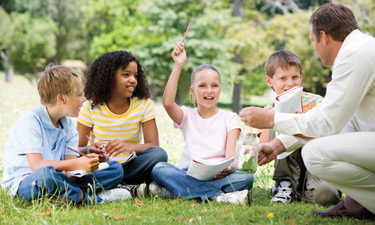 Child development is a fascinating area of study. However, sometimes we get so caught up in what is supposed to be occurring cognitively, physically and emotionally that we, as parents, uncles, aunts, grandparents, etc., forget to just stand back and watch what is happening with our children. Both of us are fathers of children who enjoy being outdoors, and this is a firsthand account of what we witness as benefits to our kids from playing in parks.
Child development is a fascinating area of study. However, sometimes we get so caught up in what is supposed to be occurring cognitively, physically and emotionally that we, as parents, uncles, aunts, grandparents, etc., forget to just stand back and watch what is happening with our children. Both of us are fathers of children who enjoy being outdoors, and this is a firsthand account of what we witness as benefits to our kids from playing in parks.
Children inherently want to move and explore the space around them. There is no better avenue for this than in our parks. Most every park offers multiple forms of free-range learning. Parks are attractive to children because they provide an avenue for escape from the structure of their daily lives. Any teacher would say that learning should start at any early age with hands-on experiences. In this case, learning should occur with nature in the parks. There is evidence that concern for the environment is based on affection for the outdoors that only develops with ungoverned contact with nature. The way children feel in the outdoors improves recall of information, creative problem solving and creativity.
In today’s culture, children are torn between the confining spaces of the couch, TV, computer screen and the cellphone. However, they often become motivated to learn when they can make their own discoveries in the outdoors. Our family visited parks in Wisconsin and Florida over an eight-month span, and our 3- and 5-year-old girls demonstrated a love of parks and deep, memory-enhancing learning by experiencing nature firsthand.
Making Connections
At Devil’s Lake State Park in Wisconsin, our girls explored the park, and, upon completing an age-appropriate, incredibly fun scavenger hunt to spot spider webs, native plants and animals, and a hiking trail, they earned their very own Wisconsin Explorer’s badges. Now, at least once a week, while exploring local parks and forests in Missouri, my children make connections. “This park looks just like Wisconsin,” said 3-year-old Karina, “because of the big trees. When can we go back to Wisconsin, dad?”
Their love of learning about the natural world carried over in a recent trip to the Gulf Coast of Florida, and Manatee Park in Lee County, Florida. As a dad, my goal is always to promote learning and conservation, while increasing health and critical thinking. I want my girls to ask why, make connections, and begin to see that they need to protect the parks. While walking through a nature trail, with palms, mangroves and native birds, my 3-year-old made the connection between parks in Florida and Wisconsin as she played a game of Manatee Bingo. She saw a spider web, just like in the Wisconsin scavenger hunt. Karina wanted to know where the spider web was on the Manatee Bingo sheet, so I drew one in for her. I was pleased that she was able to connect back to exploring parks in Wisconsin. Thanks to parks, my girls were able to make deep connections that promote learning and instill an appreciation for conservation.
Computers or cellphones can never substitute for a multisensory experience that triggers young inquiring minds. Parks are the most obvious place to stimulate the learning process, but they must provide more than sports facilities, pools and/or just serve a specific minority of children. At Devil’s Lake State Park, I appreciate that the department of natural resources created learning opportunities for youth. It invested in the backpacks that my junior explorers borrowed for their nature hikes and scavenger hunts, just as Manatee Park provided Bingo clipboards, ethnobotany trails and experiences that build connections for learning. Children also take what they have learned from one park experience and recall it while participating in a new experience. When our children participate in the design of spaces in their parks, they will also learn to respect nature and value the wildlife and land more fully.
In conclusion, we want to mention two things: (1) every day, parks offer children awesome benefits, such as a direct experience with nature and motivation to be explorers and to learn about their world in a healthy way; and (2) parks offer our children a sense of place, self-identity and belonging. We are not saying that every child will have these same experiences. We wanted to provide an example of how these parks are doing things right. In the day-to-day grind of the working world, it is easy to lose sight of those our parks are impacting.
Tyler Tapps, Ph.D., is an Assistant Professor in the Recreation Program at Northwest Missouri State University. Timothy Wall, Ed.D., is an Associate Professor in Professional Education at Northwest Missouri State University.

